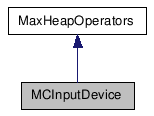Detailed Description
- See also:
- Class MCDeviceBinding, Class
IMCapManager,
Time, Character
Strings.
- Description:
- This class is available in release 2.0 and later only.
This is the base class for an input device plug-in. All methods of
this class are virtual.
In terms of the motion capture system, the basic item that is
plug-able is the motion capture device. This is something like a
mouse, joystick, or midi device. Developers implement two classes,
this one, MCInputDevice, and
MCDeviceBinding. There is
usually only one instance of MCInputDevice. This is like
the virtual mouse, or the joystick. This represents the actual
device. An instance of the device binding represents an instance
where a motion capture controller has been bound to a device, i.e.
the user has picked the device and assigned it to a parameter. Thus
there may be many instances of the device binding. The device
binding is part of the reference hierarchy. The device itself
doesn't usually have any parameters for the user to adjust -- these
are rather part of the device binding.
Some simple sample code for the mouse motion capture device is
available in /MAXSDK/SAMPLES/MOCAP/MCDEVICE.CPP.
#include <mcapdev.h>
List of all
members.
Constructor & Destructor Documentation
Member Function Documentation
| virtual MSTR DeviceName |
( |
|
) |
[pure virtual] |
| virtual void UtilityStarted |
( |
IMCapManager * |
im |
) |
[inline, virtual] |
- Parameters:
- IMCapManager *im
This is an interface into the motion capture manager.
- Default Implementation:
- {}
| virtual void UtilityStopped |
( |
IMCapManager * |
im |
) |
[inline, virtual] |
- Parameters:
- IMCapManager *im
This is an interface into the motion capture manager.
- Default Implementation:
- {}
| virtual void Cycle |
( |
UINT |
tick |
) |
[inline, virtual] |
- Parameters:
- UINT tick
The time of this call in milliseconds.
- Default Implementation:
- {}
MCInputDevice MCInputDevice
MCInputDevice MCInputDevice MCInputDevice MCInputDevice
MCInputDevice MCInputDevice MCInputDevice MCInputDevice
MCInputDevice MCInputDevice
MCInputDevice MCInputDevice MCInputDevice MCInputDevice
MCInputDevice MCInputDevice MCInputDevice MCInputDevice

